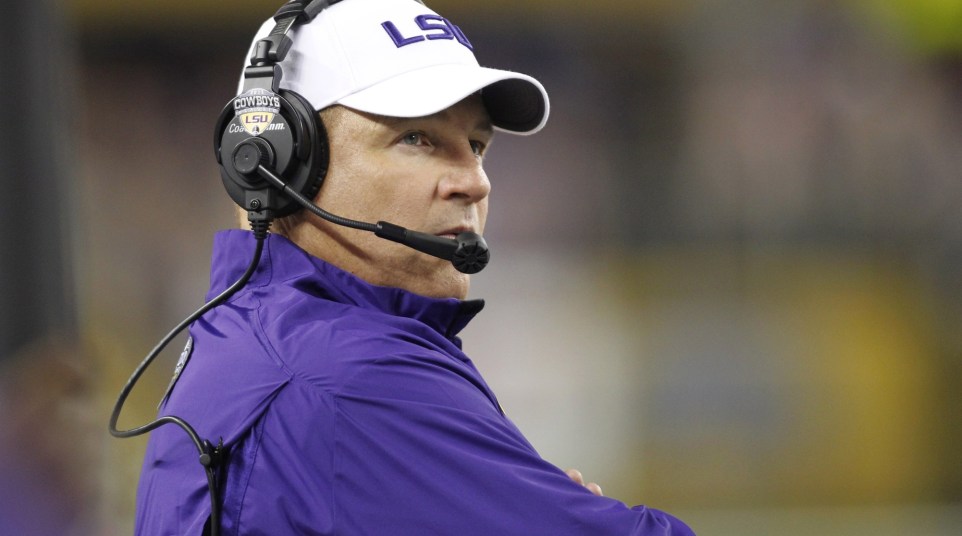LSU has quicker route back to 10 wins than 2008-09 teams
Les Miles has been almost unequivocally successful at LSU. In 10 seasons, he’s won 10 or more games seven times, a ratio that just about any school in the country would take.
Miles is coming off perhaps his worst year at LSU, one that included an 8-5 record, a 4-4 mark in the SEC and a disappointing defeat at the hands of Notre Dame in the Tigers’ bowl appearance.
The last time LSU won eight games was back in 2008, just a year after the Tigers had won a national championship. They followed that season with the second sub-10 win campaign of Miles’ LSU tenure, a 9-4 effort in 2009.
One thing that those two iterations of LSU had in common with last year’s was a major talent drain that can be directly linked to on-field struggles. In the 2008 and 2009 NFL drafts, LSU had 13 players chosen in total, including two first round picks and five players chosen in the first three rounds. The two drafts prior to last season were even more taxing on LSU’s talent pool, with 18 players chosen, many of them underclassmen. This year’s team has the luxury of having lost far fewer players to the draft — three early entrants and four total draft picks, not including La’el Collins.
Like in 2008 and 2009, LSU had to turn to young passers who weren’t ready to lead the team quite yet. After four straight 10-win seasons from 2010-13, two of them led by future NFL quarterback Zach Mettenberger, LSU turned the offense over to Anthony Jennings and Brandon Harris, neither of whom was ready to play quarterback in the SEC. The frustrations fans had with Jennings (and Harris, who was unable to even get on the field following his failed start against Auburn) aren’t too dissimilar to the gripes about Jordan Jefferson and Jarrett Lee, who split time running the offense from 2008-11.
In their first year at the helm, 2008, the two both put up similar numbers to what Jennings posted in 2014, completing around 50 percent of their passes and doing nothing to move the offense along. Luckily, LSU had a strong rushing attack to lean on, led by Charles Scott, to keep the offense afloat while both the passing game and defense had their druthers. LSU now has an even more potent running back in Leonard Fournette, but the Tigers are hoping for improvement out of Harris and Jennings that they didn’t get form Lee and Jefferson in subsequent seasons.
There’s good reason to believe LSU could jump back to 10-win status in just a year, unlike the ’08-09 teams. The defense was ranked at the top of the SEC last year, as opposed to ninth and sixth in 2008 and 2009, respectively. On top of that, this year’s unit wasn’t hit nearly as hard by losses to the draft as in previous years. Yes, three players left early, but LSU has plenty of depth and talent on hand to make up for those losses.
LSU has also recruited better the last two years than it did in 2008 and 2009, the classes that made up much of the depth on those two previous eight- and nine-win teams. LSU pulled in the No. 1 class in 2009, but the year before that ranked No. 12. Meanwhile, the two recruiting classes for the Tigers in 2014 and 2015 have been No. 2 and No. 6 in the nation, respectively, and many of the players from that 2014 class have already seen the field.
The Tigers still have issues to iron out before the season, mainly that quarterback spot. The bones are in place to make a quicker jump back to 10 wins, even in the rough-and-tumble SEC West.
Keep in mind, just two years after winning nine games in 2009, LSU was SEC champion and in the national title game, fielding one of the most talented teams the school has ever seen. LSU likely won’t be at that level this fall, but a rebound season definitely seems more than possible.

